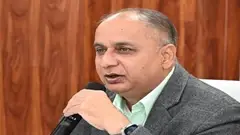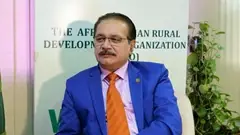
1. What are your thoughts on the Union Budget 2023? Does it really cater to the farmers?
The Union budget in recent years has been addressing the agriculture sector as the first agenda item. But, in reality, excluding PM KISAN, the real rise is marginal on a YoY basis. Out of this year’s allocation of 115532 crores, about 52% is allocated for PM KISAN. Further, compared to last year, it is short by about 8459 crores, which is also due to a reduction in PM KISAN allocation by 8000 crores. The visionary “sustainable farm livelihoods” would be a myth, unless the focus shifts to gross capital formation (GPF). GPF during 2010-2013 was around 37-39% whereas, in subsequent years, it has been hovering around 32-33%, despite about a 70% increase in budgetary allocations.
2. Do you think if there was a cross-talk between ministries, the implementation of agricultural schemes would go smoother?
The Saptarishis “Inclusive development and Reaching the last mile” could come to fruition only when there is a seamless movement of validated big data and information among repositories of various ministries and Centre-State and vice versa. The digital agriculture infrastructure envisages collating valuable information and providing it at the doorstep of the farmer. Similarly, all Saptarishis directly or indirectly contribute to the agriculture sector. So, a cross-talk facilitated by formal function networking of the ministries as well as States is essential to ensure i) identifying real needy beneficiaries; ii) packaging of the schemes for improved livelihoods in a holistic way, and iii) saving on sparse valuable resources.
3. In your opinion, are there any benefits of the PM PRANAM Scheme for Green Farming?
With 44 lakh organic farmers planting about 59 lakh ha and a dwindling animal population in the agriculture sector calls for large quantities of quality bio-inputs. The PM PRAMAN to establish 10000 bio-input centres is a march towards eco-friendly agriculture. But, it has to be supported by i) qualified production personnel, ii) research backstopping for validation of various formulations; and iii) liaison with premier research institutes for constant handholding. Despite all efforts, the Government setup cannot meet the huge demand and hence the successful model should be transferred to the industry over time with good governance. The lessons learned from “Biocontrol laboratories” by united Andhra Pradesh Government may help refine the approach.
4. Are there any advantages of the reduced import duty on inputs of shrimp farming?
India’s shrimp industry depends on imported larval seeds, artemia, and shrimp broodstock. Imported frozen krill, squid, and mussels are used as feed in hatcheries. Though squids and mussels are available in India, due to the vulnerability of shrimps to diseases, they are not preferred. Out of total shrimp feed, fishmeal constitutes about 30% valued at about 49 million USD. So, the reduced import duty will reflect a reduction in the cost of production and thus improve profitability. This will also prevent the use of juvenile fish used as fish meal and so improve marine fish stock availability. However, its impact on local feed manufacturers needs a detailed analysis.
5. How to pursue a career in agricultural science?
Due to the implementation of a harmonized program structure pan India by the Indian Council of Agricultural Research, the curriculum has been well-structured from fundamentals to federating trade over 4 years. The dedicated practical training during the final year to impart skill sets for agri-prenuership and higher education build confidence in the graduates. The Government boost through start-up culture, PM Kisan Drones, PM Kaushal Yojana, and many other schemes help the graduates to become “job-givers” than “job-seekers”. For successful career pursuance, there is a need for a changed attitude of both teacher and the taught. The teacher should incorporate new knowledge coupled with hands-on skill enhancement in the pedagogy for outcome-based learning, while the teacher should contrast between classroom learning and real-time farm situation to innovate plausible solutions.















Share your comments